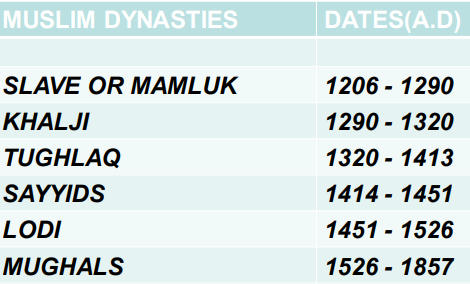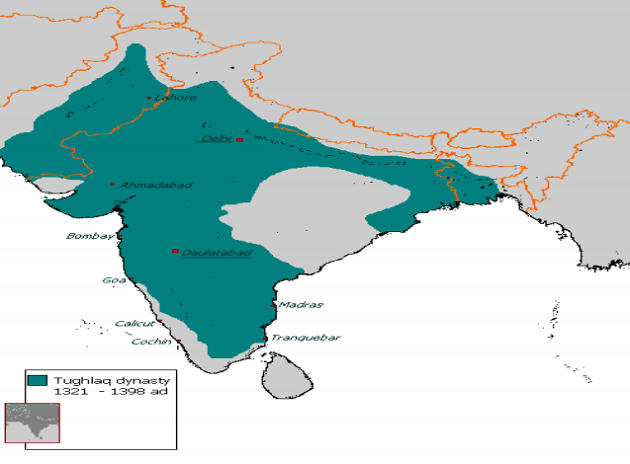Table of Contents
MUSLIM DYNASTIES


SULTAN
- His father was Rajjab, younger brother of late Sultan Ghiyas-ud-din Tughluq. His mother was the daughter of Ran Mal, a petty Rajput chief of Abohar in the modern district of Hissar in east Punjab. He was born in 1309 A.D.
- His reign lasted for about 37 years from 1351 to 1388 A.D. During his rule, Firoz Tughlaq adopted measures like revenue reforms, irrigation works, charitable programmes and public works etc. which won praise from various quarters.
ASSESSMENT OF THE REVENUE
- At the same time, his military expeditions, slave system, feudal practice and religious policy etc. brought discredit to him.
- Firoz Tughlaq appointed a special officer namely Khawja Hisan-ud-Din to prepare an estimate of the public revenue of the kingdom
- Thereafter he fixed the revenue of the ‘Khalsa’ land (Government land) in the kingdom at six crores and eighty-five lakhs of ‘Tankas’ (silver coins).
NEW SYSTEM OF TAXATION
- ‘Kharaj It was the land tax which was equal to onetenth of the produce of the land.
- ‘Zakat’: It was two-and-half per cent tax on property realized from the Muslims and utilized for specific religious purposes only.
- ‘Kham’:It was one-fifth of the booty captured and the four-fifth was left for the soldiers.
- ‘Jijya’:It was levied on the Non-Muslim subjects, particularly the Hindus. Women and children were, however exempted from the taxes.
IRRIGATION WORKS
- Longest canal were one which carried the waters of the river Jamuna to the city of Hissar. It was 150 miles long.
- The second canal was drawn from river Sutlej to Ghaghra. It was about 100 miles long.
- The third canal was from Mandvi and Sirmur hills to Hansi.
- The fourth canal ran from Ghaghra to Firozabad.
NOTABLE WORK
- ‘Diwan-i-Kherat:The marriage bureau gave grants to the poor parents for the marriage of their daughters. It also provided financial help to the poor
- ‘Dar-ul-Shafa’: Hospitals were set up in important towns where medicines were given free of charge.
- ‘Sarais’:About 200 (rest houses) were built by the Sultan for the benefits of merchants
- Grants to sufferers
TOWNS
- Four important towns founded by him were of Firozabad, Fatehabad, Jaunpur and Hissar Firoza. Two pillars of Ashoka were brought to Delhi—one from Meerut and the other from Topra, Arnbala district—and erected in Delhi.
- Firoz Tughlaq was a great patron of historians, poets and scholars. He himself was a man of learning and wrote his biography entitled ‘Fatuhat-i-Firozshah’. He established thirty educational institutions including three colleges.
- Zia-ud-Din Barani wrote ‘Fatwah-i-Jahandari’ and Afif wrote his ‘Tarikh-i-Firuzshah’.
NOT AND EFFICIENT COMMANDER
- Firoz Tughlaq was not an able general. No significant conquests were made by him.
- “The southern states had drifted away from the Sultanate and there were rebellions in Gujarat and Sindh”, while “Bengal asserted its independence.” The Sultan led expeditions to against Bengal in 1353 and 1358.
- The Sultan captured Cuttack, destroyed the Jagannath Temple, Puri and forced Raja of Jajnagar in Orissa to pay tribute. He laid siege to Kangra Fort and forced Nagarkot to pay tribute, and did the same with Thatta
RELIGION
- The Sultan introduced several reforms in the army which produced negative results. This slave system proved very harmful and became one of the contributory factors of the downfall of the Tughlaq empire.
- Firoz encouraged the Hindus for conversion to Islam. Firuz was the first Sultan of Delhi who accepted predominance of Islamic laws and the Ulema in administering the state
LAST DAYS
- The later years of Firuz remained full of sorrow. His two sons had died and he nominated his third son, Muhammad Khan, as his successor. The Sultan had reached the ripe age of eighty years and therefore, had lost his mental balance.
- Prince Muhammad who shared the power of the throne with the Sultan for some time was a pleasure-seeker and therefore, neglected the administration. Some nobles revolted against the prince and captured the Sultan. After some time, the Sultan died in September 1388 A.D.





















 WhatsApp
WhatsApp